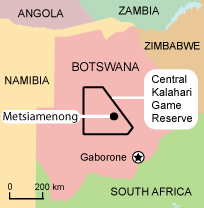Survival International claimed last week that De Beers is resuming prospecting in the Central Kalahari Game Reserve (CKGR). According to the British human rights organization, the planned exploration for diamonds in the vicinity of the San community of Metsiamenong threatens the G/wi and the other San people who live there, as well as the fragile ecology of the reserve.
 For several years, SI campaigned against De Beers since many observers felt that Botswana had exiled the G/wi from their ancestral lands in order to make sure that diamond royalties would not have to be shared with them. The San people had to be moved out of the way. SI organized protests against the diamond chain, convinced a couple of super models to break their contracts with the company, and fostered boycotts of glittering receptions in New York and London that focused on the international trade in conflict diamonds handled by De Beers.
For several years, SI campaigned against De Beers since many observers felt that Botswana had exiled the G/wi from their ancestral lands in order to make sure that diamond royalties would not have to be shared with them. The San people had to be moved out of the way. SI organized protests against the diamond chain, convinced a couple of super models to break their contracts with the company, and fostered boycotts of glittering receptions in New York and London that focused on the international trade in conflict diamonds handled by De Beers.
Since the San people won their suit against the government in the highest court of Botswana in December 2006, the G/wi have been permitted to return to their homes in the CKGR, but their access to water has been denied and they have been refused the right to hunt. Meanwhile, De Beers sold its mining rights to Gem Diamonds in 2007, so SI ceased its campaign against the international diamond conglomerate.
Steven Corry, Director of SI, said last week, “we are dismayed that De Beers feels that it can now return to the reserve whilst the situation with the Bushmen is still unresolved. Presumably it hoped no one would notice. Hundreds of Bushmen still languish in relocation camps, unable to return home because the government won’t let them hunt or use their water borehole.”
Corry added that SI would mount as strong a campaign as it could to persuade people to boycott De Beers for resuming diamond prospecting in the CKGR. He feels that the corporation should pressure the government to honor the human rights of the San people and allow them to live decently in their homes in the reserve.
The diamond company denies the SI allegations. “De Beers ceased all operations in the Central Kalahari Game Reserve in 2003. We do, however, retain a number of prospecting licenses in the reserve that are due to expire in the near future,” said Lynette Gould, a spokesperson for De Beers. She said that the company had not resumed prospecting in the CKGR.
She emphasized that the company was consulting with the relevant stakeholders, “to get a better understanding of what these issues are in order to help us determine whether or not to proceed with any low impact exploratory work in these license areas.” She suggested that the company is not inclined to engage in any further efforts in the reserve, but it wanted to explore all its options.
Ms. Gould added, “far from sneaking in and ‘hoping that no-one might notice,’ as Survival International suggests, De Beers has been engaged in a transparent consultation process that reflects our commitment to take the views of local communities seriously.” To an outside observer, it appears as if the company is taking SI seriously—perhaps as a potential threat to their profits.
In another development this week relating to the G/wi, the Mo Ibrahim prize for good governance in Africa was awarded to former Botswana President Festus Mogai, who retired in March this year. The prize of US$5 million, announced on Monday, recognized the stability and prosperity he helped foster in Botswana during his term in office. It did not mention his repression of the San peoples of the Kalahari, whom he exiled from their homes in order to make sure that the diamond royalties would only benefit the majority peoples of the country.
Survival International criticized the Mo Ibrahim Foundation for ignoring Mogae’s repression of the San people and giving the award to him anyway.